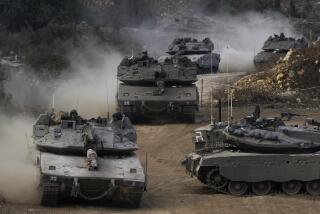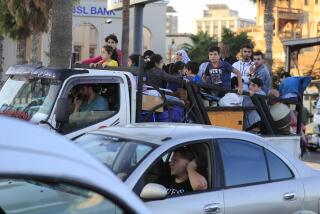Iraq’s Resistance Due to Cover-Up, Experts Say
During the past two years, Iraq has defiantly tried to acquire dual-use technology for chemical and biological weapons and missiles in the United States, Canada, France, Germany and elsewhere, according to U.N. diplomats and U.S. officials.
Those efforts and United Nations attempts to track the technology are a primary reason that Iraqi President Saddam Hussein is trying to evict American members of the U.N. weapons inspection team in Iraq, U.S. and U.N. sources said. The Americans are the most highly trained members of the team in detecting the latest technology.
U.S. inspectors also may have been singled out because they have been the most reliable members of the team in keeping secrets about targets of surprise inspections, the sources said. The Iraqi government has learned about some inspections in advance through the porous U.N. system.
On Tuesday, Iraq for the second day refused to allow American members of three U.N. inspection units to visit suspected weapons facilities. The inspections were canceled. However, a U.N. spokesman in Baghdad said early this morning that inspectors were on their way to resume monitoring at three sites; it was not clear whether any Americans were involved.
But Baghdad did postpone tonight’s threatened expulsion of seven remaining Americans until U.N. envoys scheduled to arrive in Baghdad today to discuss the standoff complete their brief mission.
In Washington, President Clinton said Hussein has no reason to block the inspectors unless he is engaged in a cover-up. “If he has nothing to hide, if he’s not trying to develop weapons of mass destruction, then he shouldn’t care whether Americans or anyone else are on the inspection team,” the president told reporters.
Clinton also warned that the Iraqi leader would be making a “big mistake” if his forces fired on an American U-2 spy plane on loan to the U.N. inspection team. At the Pentagon, Secretary of Defense William S. Cohen announced that U-2 flights over Iraq will continue, despite Iraqi suggestions this week that they might be fired upon. But later in the day, the United Nations announced that it was postponing the flights while the U.N. mediators are in Baghdad for talks with Hussein.
Iraq’s attempts to acquire dual-use technology--which has both civilian and military applications, such as precursor materials that can be used to make either pesticides or chemical weapons--has forced a major shift in the inspection program. Inspectors are now spending an increasing amount of time looking for new technology and less time destroying weapons made before the 1991 Persian Gulf War.
“There’s no question that Baghdad has made recent and persistent efforts to smuggle in equipment and technology,” a senior Clinton administration official said Tuesday. “The greatest danger in Iraq today, six years after the Gulf War, are these new efforts.”
Besides working to acquire the technology in North America and Europe, Iraq also has operated secretly through front companies set up in countries such as Saudi Arabia and Egypt that were U.S. allies in the Gulf War coalition, the diplomats and officials said.
Hussein’s goal is to eventually emerge from the embargo that the United Nations imposed after the war with the capability of assembling an arsenal of deadly weapons that would reestablish his military preeminence in the resource-rich region, U.S. analysts said.
Over the past few days, U.N. inspectors have said that they suspect Hussein created the latest crisis in part because inspectors were about to uncover new weapons programs. The current tension began in September when Iraq refused to allow inspectors into a Republican Guard military facility, where the U.N. team had seen material being carted away, sources said.
U.N. diplomats and U.S. officials said they suspect other programs are under development at the Special Security Organization, headed by one of Hussein’s sons, and the Mukhabarat secret police facility. U.N. inspectors have recently had confrontations at or been turned away from both these Baghdad facilities.
The full extent of Iraq’s postwar programs is still unknown. But based on a growing body of public evidence and intelligence, U.N. and U.S. officials and private U.S. analysts estimated that many programs may still be undetected.
In the nuclear field, Iraq has kept its scientists in position to resume work swiftly once U.N. arms inspectors leave, U.S. officials said.
Before the war, Iraq had two working nuclear weapons designs and most of the components to make them, according to Anthony Cordesman, military analyst at the Center for Strategic and International Studies in Washington. Although most, if not all, of that capability appears to have been neutralized in the years since the war, today “there’s no reason Iraq could not put together a small number of weapons as a contingency in case [fissionable] material becomes available on the arms black market,” Cordesman said.
Acquisition of new equipment is not the only danger. “Iraq continues to import from all over the world software and research papers with technical data that can be used for proliferation programs,” Cordesman added. “That is perfectly legal, but you can do a lot of damage with a research paper.”
On other weapons, Iraq has finished rebuilding plants once used to develop chemical weapons for the postwar manufacture of pesticides, administration officials said. But the precursor materials for both products are similar. “We’ve always thought these facilities could rapidly be turned over to chemical weapons production,” the senior administration source said.
Baghdad specialists also have had half a decade to work on stable forms of nerve gas weapons, binary chemical weapons and weapons with more advanced precursors--all likely activities, Cordesman said.
U.S. and U.N. officials are most concerned about biological weapons, which are the easiest to hide. The biggest recent discrepancies have centered on the difference between what materiel of this kind U.N. inspectors believe Iraq has and what it admits it has, U.S. officials said.
On its missile programs, Iraq last month publicly tested a missile with a range under about 94 miles, which is permitted under the U.N. resolutions. “But testing allows them to sustain their skills. It also shows their continued determination to rebuild once the U.N. leaves and sanctions are off,” the senior administration official said.
The best-known case of postwar Iraqi weapons smuggling involved gyroscopes for missiles imported through Jordan in 1995. “We continue to see evidence of this kind of clandestine acquisition,” a U.N. diplomat, who would not elaborate, said Tuesday.
More to Read
Sign up for Essential California
The most important California stories and recommendations in your inbox every morning.
You may occasionally receive promotional content from the Los Angeles Times.










